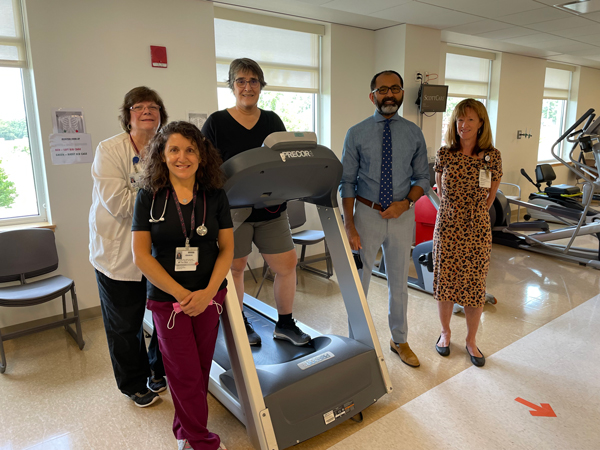September 13, 2022
Learning to Breathe Freely Again After COVID
Lauren Pashayan searched everywhere for help when she was still struggling to talk and walk without getting short of breath nearly two years after contracting COVID-19.
“The initial treatments, hospitalization, or whatever you need to keep you alive, is obviously critical,” says the 66-year-old Greenville resident. “But if you can’t do anything almost two years later, it’s very frustrating.”
Pashayan, who was a lawyer in Illinois when she contracted COVID – and has since retired to New Hampshire – says she was forced to gasp for breath simply trying to say her name and address. Using the stairs in her home was limited to once a day and required stopping every few steps to catch her breath.
“It’s amazing,” she says. “You don’t realize how much you think about breathing until you can’t breathe.”
Then, this past July, her pulmonologist recommended Elliot Hospital’s new Post-COVID Pulmonary Rehabilitation & Recovery Program – one of only two in the area, which is now being considered a model for others.
Within two months of being a patient in the program’s first-ever class, Pashayan no longer labors to breathe.
“There’s no question it gave me my life back,” she says. “I didn’t like going out or doing things because I would always hold people back. Now I’m at a point that I don’t have to think about it as much. When I forgot a book upstairs the other day, I could just go up and get it.”
The program, a brainchild of Lynn Cummings, RCP, RRT, CCT, TTS, supervisor, Pulmonary Rehabilitation Services, Elliot Health System, is a six-to-eight-week, twice-weekly class for long-haul COVID patients. Typically, patients in their 50s and 60s, they often have weakened chest, shoulder and neck muscles, from continuously struggling to breathe.
“I had seen so many long-haul COVID patients coming in still unable to breathe well, do everyday activities, barely talk above a whisper and have impaired emotional and cognition functioning,” she says. “I realized we had some empty gym space where we could have classes for these patients who needed extra help.”

Staffed by a respiratory care practitioner (RCP) and exercise physiologist (EP), instruction in the classes, limited to four to five patients, focuses on breathing exercises and retraining techniques; respiratory muscle training; energy conservation techniques; self-management; inhaler training; prone positioning and a home exercise plan which can include use of a phone application.
“We help patients get their strength back to where it was pre-COVID,” says exercise physiologist Karen Amaro. “And even, in some cases, return to the workforce.”
Results are remarkable, Cummings says. After 15 visits, Pashayan’s pulmonary functionality measurably improved by 86 percent and her lower body strength was up 260 percent. She went from being able to walk a mile per hour for six minutes to 2.3 miles per hour at a slight grade for 20 minutes.
“Getting the word out about this program is so important, because one of the most frustrating things was just finding a place that could help,” Pashayan says. “My doctors were good, but they didn’t have the information they needed. They just said, ‘Keep walking,’ which I couldn’t. When this program became available, it was a godsend.”
For more information about the Elliot Post-COVID Pulmonary Rehab & Recovery Program, visit Elliot Hospital | Pulmonary Rehabilitation in Manchester NH.
Patients require a provider’s referral. The class is covered by insurance, including Medicare.
